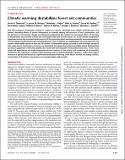| dc.contributor.author | Diamond, S. E. | |
| dc.contributor.author | Nichols, L. M. | |
| dc.contributor.author | Pelini, S. L. | |
| dc.contributor.author | Penick, C. A. | |
| dc.contributor.author | Barber, G. W. | |
| dc.contributor.author | Cahan, S. H. | |
| dc.contributor.author | Dunn, R. R. | |
| dc.contributor.author | Ellison, Aaron M. | |
| dc.contributor.author | Sanders, N. J. | |
| dc.contributor.author | Gotelli, N. J. | |
| dc.date.accessioned | 2016-11-15T18:51:47Z | |
| dc.date.issued | 2016 | |
| dc.identifier.citation | Diamond, S. E., L. M. Nichols, S. L. Pelini, C. A. Penick, G. W. Barber, S. H. Cahan, R. R. Dunn, A. M. Ellison, N. J. Sanders, and N. J. Gotelli. 2016. “Climatic Warming Destabilizes Forest Ant Communities.” Science Advances 2 (10) (October 26): e1600842–e1600842. doi:10.1126/sciadv.1600842. | en_US |
| dc.identifier.issn | 2375-2548 | en_US |
| dc.identifier.uri | http://nrs.harvard.edu/urn-3:HUL.InstRepos:29395011 | |
| dc.description.abstract | How will ecological communities change in response to climate warming? Direct effects of temperature and indirect cascading effects of species interactions are already altering the structure of local communities, but the dynamics of community change are still poorly understood. We explore the cumulative effects of warming on the dynamics and turnover of forest ant communities that were warmed as part of a 5-year climate manipulation experiment at two sites in eastern North America. At the community level, warming consistently increased occupancy of nests and decreased extinction and nest abandonment. This consistency was largely driven by strong responses of a subset of thermophilic species at each site. As colonies of thermophilic species persisted in nests for longer periods of time under warmer temperatures, turnover was diminished, and species interactions were likely altered. We found that dynamical (Lyapunov) community stability decreased with warming both within and between sites. These results refute null expectations of simple temperature-driven increases in the activity and movement of thermophilic ectotherms. The reduction in stability under warming contrasts with the findings of previous studies that suggest resilience of species interactions to experimental and natural warming. In the face of warmer, no-analog climates, communities of the future may become increasingly fragile and unstable. | en_US |
| dc.description.sponsorship | Organismic and Evolutionary Biology | en_US |
| dc.language.iso | en_US | en_US |
| dc.publisher | American Association for the Advancement of Science (AAAS) | en_US |
| dc.relation.isversionof | doi:10.1126/sciadv.1600842 | en_US |
| dash.license | LAA | |
| dc.title | Climatic warming destabilizes forest ant communities | en_US |
| dc.type | Journal Article | en_US |
| dc.description.version | Version of Record | en_US |
| dc.relation.journal | Science Advances | en_US |
| dash.depositing.author | Ellison, Aaron M. | |
| dc.date.available | 2016-11-15T18:51:47Z | |
| dc.identifier.doi | 10.1126/sciadv.1600842 | * |
| dash.contributor.affiliated | Ellison, Aaron | |


